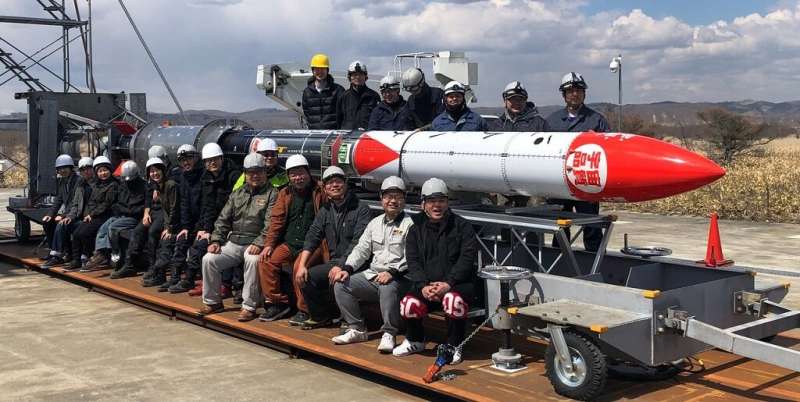Credit: Interstellar Technologies Inc.
Interstellar Technologies Inc. (IST) is in final phase of preparations for its third attempt to become the first Japanese private company to launch a small sounding rocket into space. The launch is scheduled for Tuesday, April 30 at 11:15 a.m. JST (2:15 a.m. GMT).
IST plans to send the rocket, named MOMO-F3, to an altitude of at least 100 kilometers, to reach the so-called Karman line—defined as the boundary between Earth's atmosphere and outer space.
MOMO-F3 is a 33-feet tall liquid-propellant sounding rocket, weighing some 1.15 metric tons. The launch vehicle will lift off from IST's launch pad in Taiki, Hokkaido. The company will be live streaming this event at Nvs-live.com.
IST believes that MOMO-F3 is all set for the upcoming launch. The rocket has already passed the captive firing test four times, which gave the green light for Tuesday's blastoff.
Although the mission is crucial for the Japanese private space industry, IST's CEO, Takahiro Inagawa, underlined that it should be regarded as a test flight, disclosing that the main objective of MOMO-F3 is to demonstrate the sounding rocket technology.
IST's previous launches were unsuccessful. MOMO-F2 fell to the ground and exploded shortly after its launch on June 30, 2018.
"We found that the cause of the MOMO-F2's failure was the malfunction of RCS [reaction control system], then repaired two parts: pipe structure and injector," Inagawa told Astrowatch.net.
The first rocket developed by the company, MOMO-F1, was launched in July of 2017 but communications with it were lost about a minute after it had left the pad.
IST is the first and only active Japanese company to launch a privately developed space rocket. The startup's ultimate goal is to change the economics of space launch services, making it more economic to existing customers and accessible to entirely new markets.
The company's plan regarding future launches remain currently undisclosed. Meanwhile, the startup is also working on the development of a small orbital rocket, named ZERO, designed to carry about 100 kilograms of payload into space.
Provided by Astrowatch.net
























